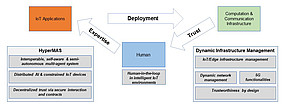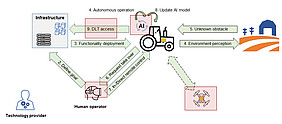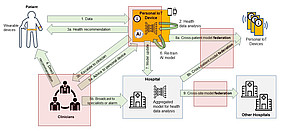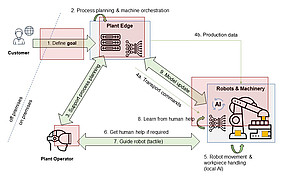- The project ‘IntellIoT’ will champion intelligent, autonomous, and human-centered solutions for the healthcare, manufacturing and agricultural sectors
- With the help of Artificial Intelligence (AI) and Internet of Things (IoT) technologies, while leveraging the capabilities of state-of-the-art 5G communication networks, IntellIoT plans to provide a reference framework for deploying applications that can handle remote operations with high levels of efficiency, quality and security
- The 3-year project has a budget of €8 million and is supported by a consortium of 13 partners from nine countries
In the fight against the coronavirus, digital technologies play an unprecedented role in the maintenance of daily life and economic and social activities, as well as in the recovery of industry and business. Accelerated through Covid-19, IoT applications now need to look beyond connecting a variety of different devices, by adding intelligence, autonomy and security to the IoT edge node, close to the users.
H2020 IntellIoT (Intelligent, distributed, human-centered and trustworthy IoT environments), is a Pan-European Research and Innovation project that started on October 1st, 2020 and is one of six research and innovation actions (RIA) initiated by the European Commission in 2020, specifically with the goal of developing innovations and collaborations by concentrating on “Next–Generation Internet of Things” powered by 5G. It aims to develop a reference architecture to enable IoT environments for (semi-)autonomous IoT applications endowed with intelligence that evolves with the human-in-the-loop, based on an efficient and reliable IoT/edge-(computation) and network-(communication) infrastructure. While employing technologies such as 5G, cybersecurity, distributed technology, Augmented Reality and tactile internet, the project champions end-user trust, adequate security and privacy by design.
IntellIoT comprises a consortium of 13 partners spread across 9 countries: Siemens AG, EURECOM, Aalborg University, University of Oulu, TTControl GmbH, Telecommunication Systems Institute (Technical University of Crete), Philips, Sphynx Analytics Ltd., University of St. Gallen, Holo-Industrie 4.0 Software GmbH, AVL Commercial Driveline & Tractor Engineering GmbH, Startup Colors UG as well as University General Hospital of Heraklion. Beyond those partners that will develop the core technologies and apply and test them in three distinct use cases – healthcare, agriculture and manufacturing (Figures 2 - 4), IntellIoT will hold two open calls. The calls are geared towards enabling startups and SMEs to build applications, services and extensions to the project’s framework in the context of the aforementioned use cases. SMEs and startups will receive up to €150,000 to execute pilot projects alongside the 13 consortia partners, in order to apply the IntellIoT technology, improve their products and services, and create new jobs.
Telecommunication Systems Institute as a key partner in IntellIoT
The Telecommunication Systems Institute (TSI) of the Technical University of Crete participates as a research partner in IntellIoT. The effort is led by Prof. Sotiris Ioannidis (School of Electrical and Computer Engineering, Technical University of Crete) and the research and development activities will be carried out by the research group of the Microprocessor and Hardware Laboratory of the ECE School of Technical University of Crete. Within IntellIoT, TSI is tasked with the development of technologies for interconnecting heterogeneous devices and presenting them to external infrastructure under common semantics (Interoperability Box / HyperMAS), while it leads the security and privacy related research. This includes trust-based computing mechanisms that will act as distributed intrusion detection systems (IDS) discriminating legitimate networking entities from the malicious/compromised ones, as well as advanced network security intelligence based on Moving Target Defences (MTDs) in order to protect unsupervised M2M communications and collaborative tasks. Last but not least, in the context of IoT deployments, TSI will work on implementing security primitives (e.g., encryption) suitable for resource-constrained devices.
TSI’s involvement in the project spans for the full duration of the project (Oct. 1, 2020 to Sept 30, 2023) with an overall budget of 426.250 €.
Contact:
- For questions related to the project please contact: Vivek Kulkarni, Coordinator IntellIoT, Siemens AG, vivekkulkarni<at>siemens.com
- For media inquiries please contact: Sarah Karacs, Communications Manager, Startup Colors, sarah.karacs<at>startupcolors.com
- For inquiries related to TSI’s activities please contact: Prof. Sotirios Ioannidis, Scientific Director, Telecommunication Systems Institute, sotiris<at>ece.tuc.gr
Links:
- Website: www.intelliot.eu
- Twitter: www.twitter.com/intelliot_eu
- Linkedin: www.linkedin.com/company/intellioteu
Further material:








